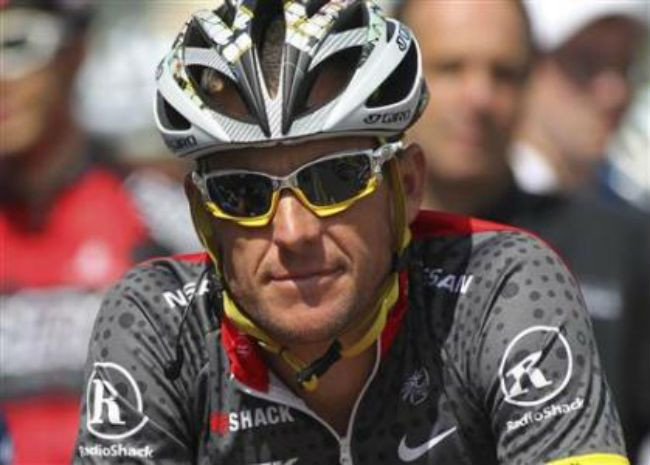
Seven-time Tour de France winner Lance Armstrong cheated his way to the top of the cycling world through the most sophisticated doping program ever seen in the sports world, the United States Anti-Doping Agency (USADA) said on Wednesday.
Evidence linking Armstrong to the use of performance-enhancing drugs included financial payments, emails, scientific data, laboratory test results, and testimony from 11 former teammates, the agency said in a long-awaited report.
Shortly after the release of the report, two cyclists who provided testimony against Armstrong - one of the world's most famous athletes who also is well known for his cancer-fighting charity work - confessed to using performance-enhancing drugs.
Armstrong has denied cheating and never failed a doping test but was banned for life by USADA in August after announcing he would not fight the doping charges.
The agency's report was sent to the International Cycling Union (UCI), the World Anti-Doping Agency (WADA) and the World Triathlon Corporation (WTC). It was more than 1,000 pages long and contained the sworn testimony of 26 people, including 15 professional riders.
USADA is the national anti-doping organization for the Olympic movement in the United States.
"The evidence shows beyond any doubt that the US Postal Service Pro Cycling Team ran the most sophisticated, professionalized and successful doping program that sport has ever seen," USADA said in a statement from chief executive Travis Tygart.
"The evidence also includes direct documentary evidence including financial payments, emails, scientific data and laboratory test results that further prove the use, possession and distribution of performance enhancing drugs by Lance Armstrong and confirm the disappointing truth about the deceptive activities of the USPS Team, a team that received tens of millions of American taxpayer dollars in funding."
George Hincapie, who rode alongside Armstrong when he won each of his seven Tour de France titles, admitted cheating and told USADA he was not alone.
"I would have been much more comfortable talking only about myself, but understood that I was obligated to tell the truth about everything I knew. So that is what I did," he said in a statement.
Another former Armstrong teammate, Canada's Michael Barry, said he was pressured to dope by the team. "After being encouraged by the team, pressured to perform and pushed to my physical limits, I crossed a line I promised myself and others I would not: I doped," he said.
'KANGAROO COURT'
Armstrong's lawyers have repeatedly attacked the credibility of USADA's case, describing the proceedings as a "kangaroo court" and a "witch hunt" on the eve of Wednesday's release.
"USADA has continued its efforts to coerce and manufacture evidence from other riders through threats and sweetheart deals and generated self-serving media coverage through leaks and piecemeal release of tired, disproven allegations," Armstrong's attorney, Timothy Herman, wrote in a letter to USADA.
"This reasoned decision will be a farce ... while USADA can put lipstick on a pig, it still remains a pig," Herman said.
USADA said the case against Armstrong and his team included eyewitness, documentary, first-hand, scientific, direct and circumstantial evidence as well as the testimony from the 11 former teammates.
Several former teammates have already spoken out publicly against Armstrong but USADA named all 11 for the first time on Wednesday. USADA said they are: Frankie Andreu, Barry, Tom Danielson, Tyler Hamilton, Hincapie, Floyd Landis, Levi Leipheimer, Stephen Swart, Christian Vande Velde, Jonathan Vaughters and David Zabriskie.
"It took tremendous courage for the riders on the USPS Team and others to come forward and speak truthfully. It is not easy to admit your mistakes and accept your punishment," USADA said.
"But that is what these riders have done for the good of the sport, and for the young riders who hope to one day reach their dreams without using dangerous drugs or methods."
The agency said that the evidence amassed in this investigation demonstrated that a "code of silence" regarding performance-enhancing drug use in cycling has been shattered, but more needs to be done.
"From day one, we always hoped this investigation would bring to a close this troubling chapter in cycling's history and we hope the sport will use this tragedy to prevent it from ever happening again," it added.
The International Cycling Union, the world governing body for cycling, had been heavily critical of the American anti-doping body for not releasing its findings sooner.
The International Cycling Union can appeal the decision to ban Armstrong for life, even though Armstrong decided not to fight the case, but the governing body said it would not respond until it had studied the report.
"We have nothing yet," International Cycling Union President Pat McQuaid told Reuters. "We will put out a press release as soon as we receive the document."
© Thomson Reuters.




